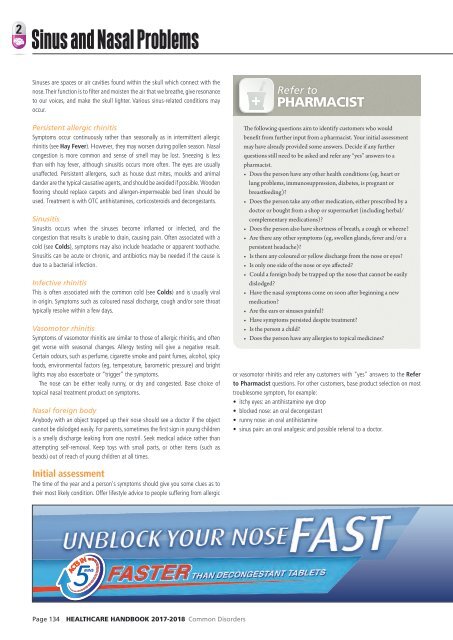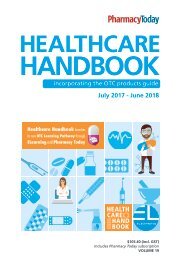2017 HCHB_digital
Create successful ePaper yourself
Turn your PDF publications into a flip-book with our unique Google optimized e-Paper software.
Sinus and Nasal Problems<br />
Sinuses are spaces or air cavities found within the skull which connect with the<br />
nose. Their function is to filter and moisten the air that we breathe, give resonance<br />
to our voices, and make the skull lighter. Various sinus-related conditions may<br />
occur.<br />
Persistent allergic rhinitis<br />
Symptoms occur continuously rather than seasonally as in intermittent allergic<br />
rhinitis (see Hay Fever). However, they may worsen during pollen season. Nasal<br />
congestion is more common and sense of smell may be lost. Sneezing is less<br />
than with hay fever, although sinusitis occurs more often. The eyes are usually<br />
unaffected. Persistent allergens, such as house dust mites, moulds and animal<br />
dander are the typical causative agents, and should be avoided if possible. Wooden<br />
flooring should replace carpets and allergen-impermeable bed linen should be<br />
used. Treatment is with OTC antihistamines, corticosteroids and decongestants.<br />
Sinusitis<br />
Sinusitis occurs when the sinuses become inflamed or infected, and the<br />
congestion that results is unable to drain, causing pain. Often associated with a<br />
cold (see Colds), symptoms may also include headache or apparent toothache.<br />
Sinusitis can be acute or chronic, and antibiotics may be needed if the cause is<br />
due to a bacterial infection.<br />
Infective rhinitis<br />
This is often associated with the common cold (see Colds) and is usually viral<br />
in origin. Symptoms such as coloured nasal discharge, cough and/or sore throat<br />
typically resolve within a few days.<br />
Vasomotor rhinitis<br />
Symptoms of vasomotor rhinitis are similar to those of allergic rhinitis, and often<br />
get worse with seasonal changes. Allergy testing will give a negative result.<br />
Certain odours, such as perfume, cigarette smoke and paint fumes, alcohol, spicy<br />
foods, environmental factors (eg, temperature, barometric pressure) and bright<br />
lights may also exacerbate or “trigger” the symptoms.<br />
The nose can be either really runny, or dry and congested. Base choice of<br />
topical nasal treatment product on symptoms.<br />
Nasal foreign body<br />
Anybody with an object trapped up their nose should see a doctor if the object<br />
cannot be dislodged easily. For parents, sometimes the first sign in young children<br />
is a smelly discharge leaking from one nostril. Seek medical advice rather than<br />
attempting self-removal. Keep toys with small parts, or other items (such as<br />
beads) out of reach of young children at all times.<br />
Refer to<br />
PHARMACIST<br />
The following questions aim to identify customers who would<br />
benefit from further input from a pharmacist. Your initial assessment<br />
may have already provided some answers. Decide if any further<br />
questions still need to be asked and refer any “yes” answers to a<br />
pharmacist.<br />
• Does the person have any other health conditions (eg, heart or<br />
lung problems, immunosuppression, diabetes, is pregnant or<br />
breastfeeding)?<br />
• Does the person take any other medication, either prescribed by a<br />
doctor or bought from a shop or supermarket (including herbal/<br />
complementary medications)?<br />
• Does the person also have shortness of breath, a cough or wheeze?<br />
• Are there any other symptoms (eg, swollen glands, fever and/or a<br />
persistent headache)?<br />
• Is there any coloured or yellow discharge from the nose or eyes?<br />
• Is only one side of the nose or eye affected?<br />
• Could a foreign body be trapped up the nose that cannot be easily<br />
dislodged?<br />
• Have the nasal symptoms come on soon after beginning a new<br />
medication?<br />
• Are the ears or sinuses painful?<br />
• Have symptoms persisted despite treatment?<br />
• Is the person a child?<br />
• Does the person have any allergies to topical medicines?<br />
or vasomotor rhinitis and refer any customers with "yes" answers to the Refer<br />
to Pharmacist questions. For other customers, base product selection on most<br />
troublesome symptom, for example:<br />
• itchy eyes: an antihistamine eye drop<br />
• blocked nose: an oral decongestant<br />
• runny nose: an oral antihistamine<br />
• sinus pain: an oral analgesic and possible referral to a doctor.<br />
Initial assessment<br />
The time of the year and a person's symptoms should give you some clues as to<br />
their most likely condition. Offer lifestyle advice to people suffering from allergic<br />
ACTS<br />
IN<br />
5MINS<br />
Voltaren Rapid 25 390x45.indd 2<br />
Page 134 HEALTHCARE HANDBOOK <strong>2017</strong>-2018 Common Disorders



